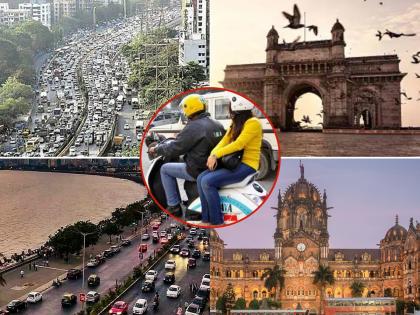E-Bike Taxis Approved in Maharashtra: What It Means for Mumbai Commuters, Here’s What Experts Say
By Ashmita Chhabria | Updated: April 15, 2025 16:46 IST2025-04-15T16:40:40+5:302025-04-15T16:46:04+5:30
While the initiative holds promise, there are concerns about its actual impact on urban traffic congestion.

E-Bike Taxis Approved in Maharashtra: What It Means for Mumbai Commuters, Here’s What Experts Say
On April 1, the Maharashtra government approved a new e-bike taxi policy aimed at promoting eco-friendly urban mobility. The policy applies to cities with a population of more than one lakh, including Mumbai and several other densely populated areas of the state. This means that e-bike taxis could soon become a common sight on the streets of Maharashtra. As per the state government’s guidelines, these e-bike taxis can currently cover a range of only 15 kilometers. Enterprises seeking to operate under this policy must have a minimum fleet of 50 electric motorcycles. Additionally, the bikes must include a physical barrier between the front and rear riders and should be equipped with a roof to provide protection during rainy weather. Once these requirements are met, businesses will be eligible to obtain permits for operation.
While the initiative holds promise, there are concerns about its actual impact on urban traffic congestion.
Challenges and Concerns:
Explaining the disadvantages of these e-bike taxis, Nemin Vora, CEO of Odysse Electric Vehicles Pvt Ltd, told Lokmat Times,
“If low-speed EV Taxis are considered for the said proposal, then road congestion may pose a threat due to speed, especially in Metro Cities. Initiatives like expanding fast-charging networks and raising public awareness can greatly speed up the adoption of electric mobility.”
He also emphasized that the infrastructure for charging and battery-swapping stations is still developing and may pose an initial hurdle.
Several critical factors must be considered before the project can be successfully rolled out. Pratik Kamdar, Co-Founder and CEO of Neuron Energy, stressed the importance of safety, regulation, and integration.
“Passenger safety should be prioritized through stringent driver background verification and regular vehicle maintenance. Regulating the number of e-bike taxis in each city will also be important to prevent overcrowding on roads. Furthermore, seamless integration with existing public transport systems and constructive dialogue with traditional taxi and auto-rickshaw unions will be key to ensuring smooth adoption of this initiative."
Environmental and Economic Benefits:
Despite the concerns, the policy has several notable advantages. For cities battling air pollution, e-bike taxis present an eco-friendly transportation alternative that could help improve air quality.
“The introduction of e-bike taxis in Maharashtra is a welcome step toward cleaner and more affordable travel. Some companies are already operating bike taxis in regions like Delhi, Noida, NCR, etc., and people who are aware of the service often prefer it for getting around the city, especially during peak traffic hours. For shorter distances, this move can help reduce the dependence on four-wheeler and ease traffic congestion. Economically, e-bike taxis cost less to operate and also help reduce air pollution, making the air cleaner and supporting a greener environment. They are quieter and require less maintenance, which benefits both drivers and passengers. If High-Speed EV Bike Taxis are opted for, then road congestion, especially in metro cities, would not be a point of concern,” said Vora.
Employment Opportunities:
In addition to being environmentally sustainable and economically viable, the new policy is expected to generate employment. The government estimates that over 10,000 job opportunities will be created in Mumbai alone, with another 10,000 jobs expected to emerge in other cities across Maharashtra.
Open in app